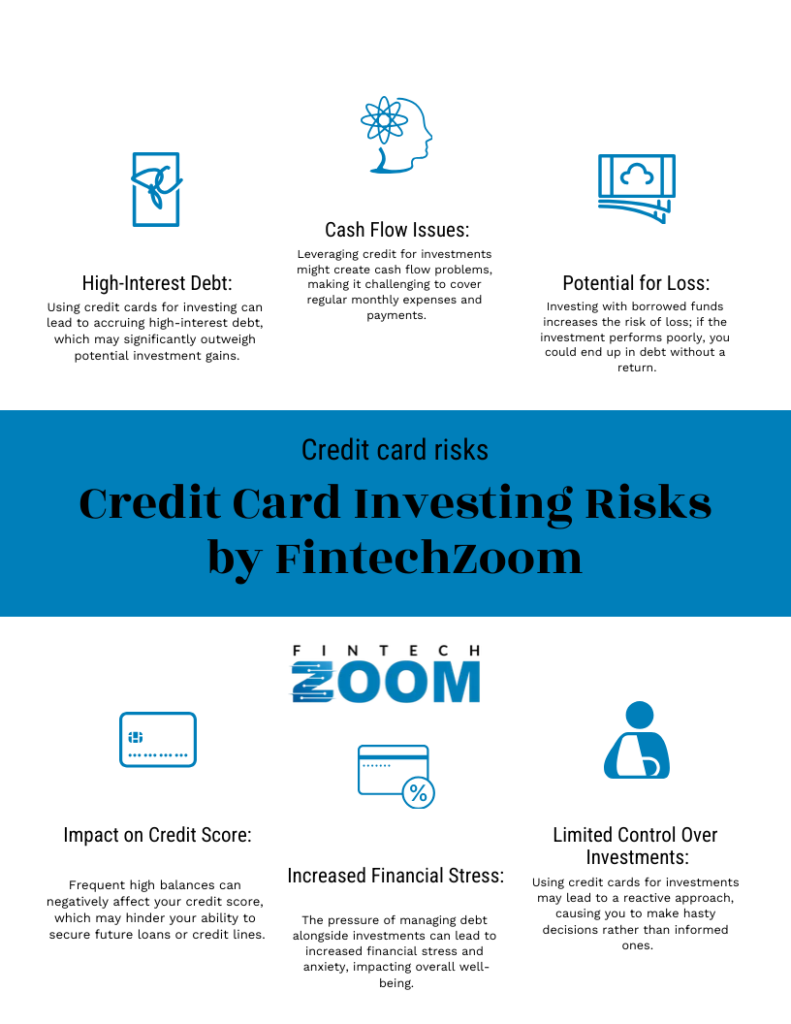Credit cards are one of the most accessible financial tools available, providing users with a sense of financial freedom. They are widely accepted at nearly every store, restaurant, and entertainment. However, they do come with some limitations.
Sergio Zammit from Techopedia provides a great example, saying most online casinos accepting credit cards allow players access to several bonuses and a wide range of casino gaming options. However, some online casinos do not accept credit cards as payment. This is largely due to licensing requirements and jurisdiction.
Just like online casinos have restrictions regarding credit card usage and regulations to follow, so do card providers themselves. So, can you use your credit card for investments and are there any restrictions or regulations that do not allow it?

Risks of Using Credit Cards for Investing
Using credit cards for investing is generally not recommended. In several countries, using credit cards to purchase stocks or other investments is not allowed or restricted by financial regulators.
Higher Interest Rates
Credit card interest rates are typically much higher than average stock market returns. While the stock market has historically provided average returns of 7% to 10% over the long term, credit card interest often exceeds 19%. This discrepancy in interest rates is quite massive, making it extremely difficult to profit from investments made with borrowed money.
Potential for Debt
If your investment were to lose value, you still owe the credit card balance, including the interest. This situation can quickly lead to a nasty cycle of debt, especially if you are unable to repay the amount you borrowed for the investment.
Impact on Your Credit Score
Using a significant chunk of your credit card limit can severely impact your credit score. Your credit utilization ratio determines your credit score. If you use a large portion of your credit limit for an investment, your credit utilization ratio increases quite a bit. This sudden spike in use can cause your credit score to drop. This can have long-lasting effects on your financial health, and frankly not worth lowering your credit score for.
Fraud Risks
The Securities and Exchange Commission (SEC) warns that pressure to use a credit card for investing might be a sign of a scam. This warning from the SEC is part of their efforts to protect investors from fraudulent investment schemes.
- Legitimate investment practices: Most licensed and registered investment firms do not allow customers to use credit cards to purchase investments or fund investment accounts. This is a standard practice in the regulated financial industry.
- Red flag for scams: When someone pressures you to use a credit card for investing, it’s often a tactic used by fraudsters. Legitimate financial professionals typically don’t encourage this practice.
- Unregistered sellers: The SEC specifically mentions “unregistered and unlicensed sellers” because these individuals or entities are not authorized to sell securities or investment products. Operating without proper registration is illegal and a major red flag.
- Ease of fraud: Credit cards can make it easier for scammers to quickly obtain funds from victims. Unlike bank transfers or checks, credit card transactions can be processed rapidly.
- Limited recourse: While credit cards offer some fraud protections, investment scams can be complex. By the time a victim realizes they’ve been defrauded, it may be too late to dispute the charges with their credit card company.
- Regulatory concern: This warning reflects the SEC’s ongoing efforts to combat investment fraud and protect retail investors from sophisticated scams.
- Due diligence emphasis: The SEC encourages investors to verify the registration status of any person or firm offering investments before committing funds.
Safer Alternatives for Credit Card Investing
While directly using a credit card to purchase investments is not recommended, there are much safer ways to use your credit card usage for investing:
Micro-Investing Apps
Some investment platforms offer features that allow you to link your credit card for indirect investing:
- Round-Up Investing: These apps automatically round up your credit card purchases to the nearest dollar and invest the difference. For example, if you spend $3.50, it rounds up to $4 and invests $0.50.
- Spend-Linked Investing: Some apps offer features that invest small amounts when you make purchases with linked cards.
These methods are considered safer because they invest small amounts gradually, reducing risk. They also don’t involve borrowing large sums on your credit card and they encourage regular, habitual investing.
Rewards Cards for Investing
Some credit card issuers offer investment rewards cards specifically designed for investors. These cards offer cash back or points that can be directly deposited into linked investment accounts. This approach is safer because you’re investing money you would have spent anyway and it doesn’t involve taking on debt to invest. It aligns your everyday spending with your investment goals.

Investing Cash Back Rewards
If you have a standard cash back rewards credit card, you can:
- Request your cash back as a check or deposit.
- Set up a low-fee brokerage account.
- Manually deposit your cash back rewards into the brokerage account to invest.
This method is considered a much safer option since you are only investing “extra” money earned through rewards. This means that it doesn’t increase your credit card debt and allows for more controlled, deliberate investing decisions.
Legal and Regulatory Considerations
The use of credit cards for investing is often restricted or prohibited by financial regulators in many countries. For example, in India, the Securities and Exchange Board of India (SEBI) has explicitly banned the use of credit cards for any form of financial investment. This regulation is designed to protect both investors and financial institutions from potential risks associated with using borrowed money for investments.
In the United States, while there’s no outright ban, most licensed and registered investment firms do not allow customers to use credit cards to buy investments or fund investment accounts. This stance is supported by regulatory bodies like the SEC and the Financial Industry Regulatory Authority (FINRA).


